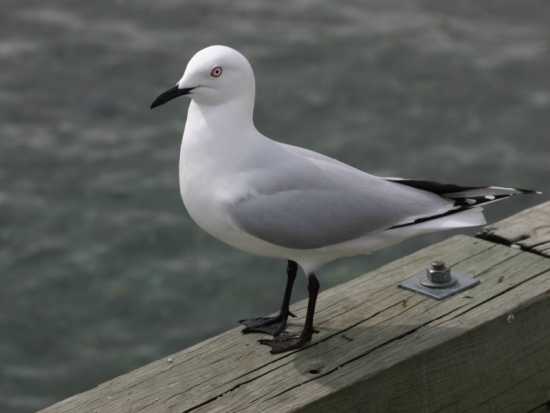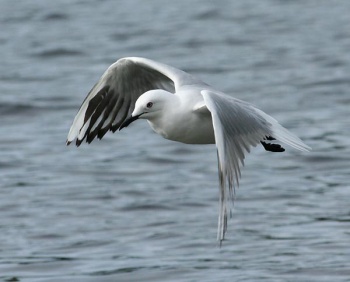(Attempt to disguise some copied text. Juvenile & Flight photos. References) |
m |
||
| Line 1: | Line 1: | ||
[[Image:Black-billed_Gull.jpg|thumb|550px|right|Photo by {{user|janha|janha}} <br />Lake Wakatipu, [[New Zealand]], October 2004]] | [[Image:Black-billed_Gull.jpg|thumb|550px|right|Photo by {{user|janha|janha}} <br />Lake Wakatipu, [[New Zealand]], October 2004]] | ||
;[[:Category:Larus|Larus]] bulleri | ;[[:Category:Larus|Larus]] bulleri | ||
| + | ''Chroicocephalus bulleri'' | ||
==Identification== | ==Identification== | ||
37cm<br /> | 37cm<br /> | ||
| Line 32: | Line 33: | ||
==External Links== | ==External Links== | ||
{{GSearch|Larus+bulleri}} | {{GSearch|Larus+bulleri}} | ||
| − | [[Category:Birds]][[Category:Larus]] | + | [[Category:Birds]][[Category:Larus]] [[Category:Chroicocephalus]] |
Revision as of 19:20, 14 April 2010
- Larus bulleri
Chroicocephalus bulleri
Identification
37cm
- Grey and white plumage
- Black bill and legs
- Black wing tips
Juvenile: paler legs and bill, dark eyes and small white mirrors on the wings.
Similar Species
Distribution
New Zealand, breeding in South Island, wintering in North Island.
Taxonomy
This is a monotypic species 1 which is sometimes placed in genus Chroicocephalus.
Habitat
Usually seen inland at rivers, freshwater lakes and marshes, sandy shores, pastures and in towns.
Status
Classified as Endangered in the 2008 IUCN Red List.2
Behaviour
Diet
The diet includes fish and aquatic invertebrates, insects, beetles and worms.
Breeding
The birds are faithful to their breeding site returning each year. Both adults construct the nest, which is a deep depression lined with twigs and grass, during October. The clutch consists of 1-3 eggs which are incubated by both adults for around 22 days. The chicks are tended by both adults until fledging at 26 days.
References
- Clements, JF. 2009. The Clements Checklist of Birds of the World. 6th ed., with updates to December 2009. Ithaca: Cornell Univ. Press. ISBN 978-0801445019.
- BirdLife International (2008) Species factsheet: Larus bulleri. Downloaded from http://www.birdlife.org on 16/9/2008.
- Wikipedia
- ArKive
- BF Member observations
Recommended Citation
- BirdForum Opus contributors. (2024) Black-billed Gull. In: BirdForum, the forum for wild birds and birding. Retrieved 25 April 2024 from https://www.birdforum.net/opus/Black-billed_Gull






